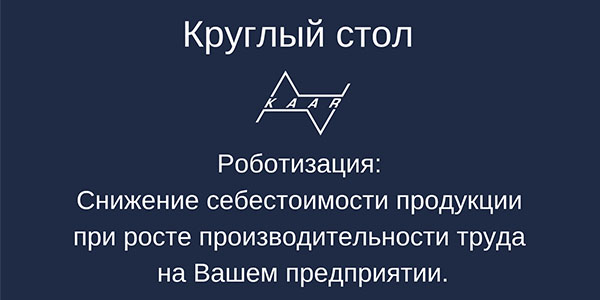
On September 23, 2021 the Kazakhstan Association of Automation and Robotics together with the Association of Kazakhstan Machinery Industry conducted the Round Table ‘Robotics: Decrease in Product Self-Cost at Labor Efficiency Growth in Your Enterprise’ that took place in the hybrid format within frames of the IX Kazakhstan Machinery Manufacturers Forum. Some speakers physically presented in the event, and some of them joined online.
27/10/2021 News / Association newsThe following persons participated in the event:
Vladimir Turekhanov, the President of the Kazakhstan Association of Automation and Robotics
Petr Smolentsev, the Commercial Director of the KUKA Representative in the CIS countries
Aidar Kakimzhanov, the Vice-Chairman of the QazIndustry Kazakhstan Industry and Export Center JSC
Alexander Papp, the Vice-President of the KELET JSC
Maxim Trubchaninov, the Technical Director of the Quant Robotics LLP
Sergey Tkachuk, the Lead Engineer of the Karasai Machine-Building Plant LLP
Almas Shintemirov, the Associated Professor of the Chair of Robotics and Mechatronics of the School of Engineering and Digital Sciences of the Nazarbayev University Autonomous Educational Organization.
Asylbek Ozhiken, the Robotics Project Manager of the «ProLabSupport» LLP
Vladimir Turekhanov addressed his welcoming speech to the round table participants. He highlighted the following key topics:
- Development of the robotics worldwide and in Kazakhstan
- Existing and estimated actions of the state support
- Integration of robot systems into enterprises and the robotic automation results
- Payback of robotic automation in enterprises
- Education in the area of industrial robotics in the country.
Petr Smolentsev, the Commercial Director of the KUKA Representative in the CIS countries, told how industrial robots were used in international and Russian enterprises.
Petr provided statistical indices of economic and epidemiologic crises periods. Also how robot systems had been spread in the territory of Russia was demonstrated to the round table participants by way of example of graphic statistical data.
The KUKA Representative told about manufacturers’ profit as a result of replacement of workforce to the robot systems and explained the growth of the robot technology market in the pandemic period.
The presents reviewed histories of success of various production companies as a result of integration of robotics into production processes. There were shown examples of some enterprises in Kazakhstan, Uzbekistan and Russia in various areas of industry and their advantages after application of robots in the processes.
Aidar Kakimzhanov, the Vice-Chairman of the QazIndusrty Kazakhstan Industry and Export Center JSC explained the expected actions of state support of industrial enterprises in case of integration of robotic solutions.
There were announced various actions of stimulation and support of the country industrial development, reimbursement of optimization costs, education and enhancement of technical processes.
Aidar Kakimzhanov also disclosed opportunities to reimburse enterprise certification and audit costs, co-financing of technical equipment and personnel professional development.
Alexander Papp, the Vice-President of the KELET JSC said a few words about the experience of integration of industrial robots into his enterprise.
Alexander explained what motivated the company’s management to take a decision on enterprise automation, revealed the problems which were overpassed at the first phase of integration and showed clear benefits such as the short pay-back period, time and area saving. It is important that this action did not result in job cuts.
Maxim Trubchaninov, the Technical Director of the Quant Robotics LLP and Sergey Tkachuk, the Lead Engineer of the Karasai Machine-Building Plant LLP showed and told about development and integration of the robot system in production of metal structures.
With the help of visuals and in detail they demonstrated their visions of the integration process on the part of the integrator and on the part of the Plant. They discussed the automation results and the need for a sufficient number of integrators in the country. According to Sergey, after the integration of the robotic welding complex none of the welders were made redundant.
Maxim also presented the Quant Software for automatic on-the-fly re-programming of robots that helped to launch production of details directly from the design engineer’s working place.
The educational part of the Round Table was introduced by Almas Shintemirov, the Associated Professor of the Chair of Robotics and Mechatronics of the School of Engineering and Digital Sciences of the Nazarbayev University Autonomous Educational Organization. There were announced student educational programs, and there was told how the Chair of the University was equipped. Almas Shintemirov shared his hopes for increase in popularity of the Faculty of Robotics and Mechatronics.
Asylbek Ozhiken, the Robotics Project Manager of the «ProLabSupport» LLP confided to the achievements and difficulties in training of specialists for the area of industrial robotics. According to Asylbek, for high-quality education Kazakhstan students were lacking practical classes with application of real robotic systems. He hoped that specialized educational institutions would be opened. Asylbek noted that their company had already integrated robotic boxes into educational and scientific institutions of the country.
In conclusion of the Round Table Vladimir Turekhanov, the President of the Kazakhstan Association of Automation and Robotics made a closing speech and announced readiness of the Association to help industrial enterprises in any issues of production robotic automation.
Remind you that the Round Table of the Kazakhstan Association of Automation and Robotics took place in the hybrid format within frames of the IX Kazakhstan Machinery Manufacturers Forum and the I International Specialized Exhibition of Machine-Building and Metal Processing. In spite of the restricted measures related to the epidemiologic situation, the organizers managed to carry out the event in the hybrid format: online/offline.
